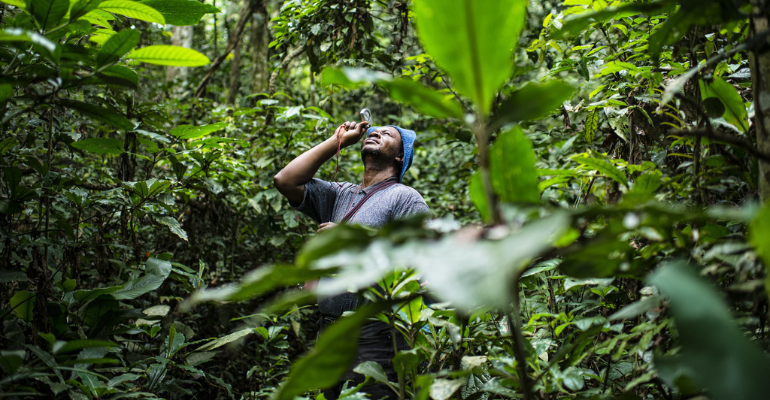
Carbon offsets are diverting money away from climate action in the Global South
Myth: “Carbon offsets are the most efficient way to finance climate action in the Global South”
SOMO’s ‘Facing the facts: carbon offsets unmasked’ series debunks eight myths promoted by the offset industry.
Carbon market proponents claim:
Carbon offset proponents frequently point to the enormous gap in climate funding in the Global South. They argue that carbon offset projects provide funds for important climate action, such as protecting forests, developing low-carbon economic activities, and supporting communities. The proponents claim that the critics of carbon offsetting are essentially undermining the development opportunities of poorer nations.
Reality check:
Most of the funds involved in carbon offsetting circulate amongst private actors and businesses in the Global North
A notable feature of the carbon offsetting industry is that the majority of the projects that generate carbon credits are in the Global South, while many project developers are companies and organisations based in the Global North. Research by GRAIN(opens in new window) , an organisation that supports small farmers and social movements, identified 279 large-scale plantation offset projects in the Global South. While project developers in China, India and Brazil were responsible for most of the projects in those countries, most other offset projects in the Global South were run by entities based in Europe and the US.



Despite being promoted as providing funding for climate action and communities in the Global South, the carbon offsetting industry is opaque when it comes to financial flows. There is no transparency about how much money ends up with the countries and communities where offset projects are implemented, nor how much goes to the project developers and businesses involved in the sale of carbon credits. Research published in 2023 found that nine out of 10(opens in new window) intermediaries in the offsetting industry do not disclose their fees or profit margins. However, independent investigations are increasingly exposing how little of the funding reaches communities. For example, a major investigation(opens in new window) into one of the largest offset projects in Kariba, Zimbabwe, suggested that the amount reaching communities was 6%, at most. Several other investigations have also shown that much of the benefits from carbon offsetting promised to communities do not materialise(opens in new window) .
These reports are consistent with how the industry has evolved. From project developers to the entities that validate and verify carbon credits to the traders, there is a growing number of actors seeking to profit from carbon offsetting. Any industry with a host of associated service providers will always see funds diverted to those entities, and the least powerful actors in the system usually get the smallest share of the funds. For example, a joint investigation by Unearthed(opens in new window) and SourceMaterial (opens in new window) found brokers buying carbon credits from forest-based projects in low-income countries and selling them to consumers and companies, including airlines and oil firms, at inflated prices. According to the investigation, brokers resold credits for at least three times the purchase price in almost 250 projects. The same report quoted leaked emails in which a broker told a potential buyer that “typically 85-95 per cent” of any purchase price goes to the project owner. In the same exchange, the broker “offered credits at a price seven times what they had originally paid to the project leader.”
There is enough money to address climate change; the lack of funds is an industry myth
The myth of scarcity of funding has been used for years to advance business interests. It is leveraged to promote the idea that we need the private sector and private capital to fund the solutions to social and environmental problems – everything from addressing climate change to providing health care. This myth has created innumerable opportunities for businesses to demand policy support and government subsidies and to gain access to public funds as insurance or co-funding.
The scarcity of funding fallacy has been deeply embedded in the narrative of the carbon offsetting industry. However, the problem is not a lack of funding but choices about where funds go and who controls them. For example, in 2022, donors provided an estimated $31.5 billion(opens in new window) in grant-based climate funding for the Global South, well below the $1 trillion a year(opens in new window) , which has been widely accepted as the amount needed. That same year, the Global North paid out fossil fuel subsidies amounting to $2.5 trillion(opens in new window) , a figure nearly 80 times higher. Despite growing evidence of grave limitations, carbon offsetting itself receives massive state subsidies. To date, governments have subsidised Carbon Capture and Storage schemes(opens in new window) , which barely make a dent in reducing emissions, to the tune of at least $30 billion, and have planned a further $200 billion in support. Five governments(opens in new window) —the United States, Norway, Canada, the European Union, and the Netherlands – makeup 95% of this spending.
A tiny minority of people and companies hold most of the world’s wealth, and many have made, and continue to make, their money from fossil fuel-driven businesses. Massive companies, including major oil and gas companies, continue to use aggressive tax planning to avoid taxes, denying countries billions of dollars in revenues(opens in new window) . An analysis by the Tax Justice Network in 2023 found that the world could lose $4.8 trillion to tax havens over the next decade(opens in new window) . Research by Oil Change International(opens in new window) shows that rich countries could generate $5 trillion a year from a combination of wealth and corporate taxes and a crackdown on fossil fuels.
The solutions to the funding shortfall for climate response are already on the table and only require policymakers to act. Ending tax avoidance, stopping fossil fuel subsidies, and establishing wealth taxes would not only generate funding but also help address global wealth inequality, another goal the world’s governments claim to be committed to.
The money to address climate change exists. Redistribution and reparations(opens in new window) are the policy tools needed to move money to the Global South in a just and fair manner and to support vulnerable communities in the North. This approach generates more money and curbs the industries that continue to be responsible for the growth of emissions and resource consumption and – most importantly – centres on justice.
In a nutshell
There is growing evidence that very little of the money made in the carbon offsetting industry ends up with the communities and countries where offset projects are implemented. On the contrary, a range of private actors – most in the Global North – are generating sizeable revenues from trading in carbon credits, money that is not used to support real climate action.
Meanwhile, policy tools already exist to pay for climate action in the Global South. Ending tax avoidance and imposing wealth taxes along with other legal means of expropriation of excessive wealth, done alongside ending the obscene practice of ongoing fossil fuel subsidies, could generate the trillions needed. These funds can and should be transferred to the Global South in the framework of reparations.
What’s the alternative? Read more about how to think outside the ‘offset box’ at the end of this series.
More from the blog series
-
To achieve real emission reductions, carbon offsetting needs to endPosted in category:Long read
 Joanna CabelloPublished on:
Joanna CabelloPublished on: -
The offset industry, riddled with conflicts of interest, is not fixablePosted in category:Long read
 Ilona HartliefPublished on:
Ilona HartliefPublished on: -
Regulation to reduce CO2 emissions is the most effective way to address climate changePosted in category:Long read
 Joanna CabelloPublished on:
Joanna CabelloPublished on: -
Carbon offsets are an obstacle to real climate solutionsPosted in category:Long read
 Ilona HartliefPublished on:
Ilona HartliefPublished on: -
A brief history of colonialism, climate change and carbon marketsPosted in category:Long read
 Joanna CabelloPublished on:
Joanna CabelloPublished on: -
Carbon offsets often disenfranchise communitiesPosted in category:Long read
 Joanna CabelloPublished on:
Joanna CabelloPublished on: -
Climate leadership means reducing real emissionsPosted in category:Long read
 Audrey GaughranPublished on:
Audrey GaughranPublished on: -
-
Scaling up carbon markets means scaling up emissions and abusePosted in category:Long read
 Joanna CabelloPublished on:
Joanna CabelloPublished on:
Do you need more information?
-

Joanna Cabello
Senior Researcher -

Ilona Hartlief
Researcher

